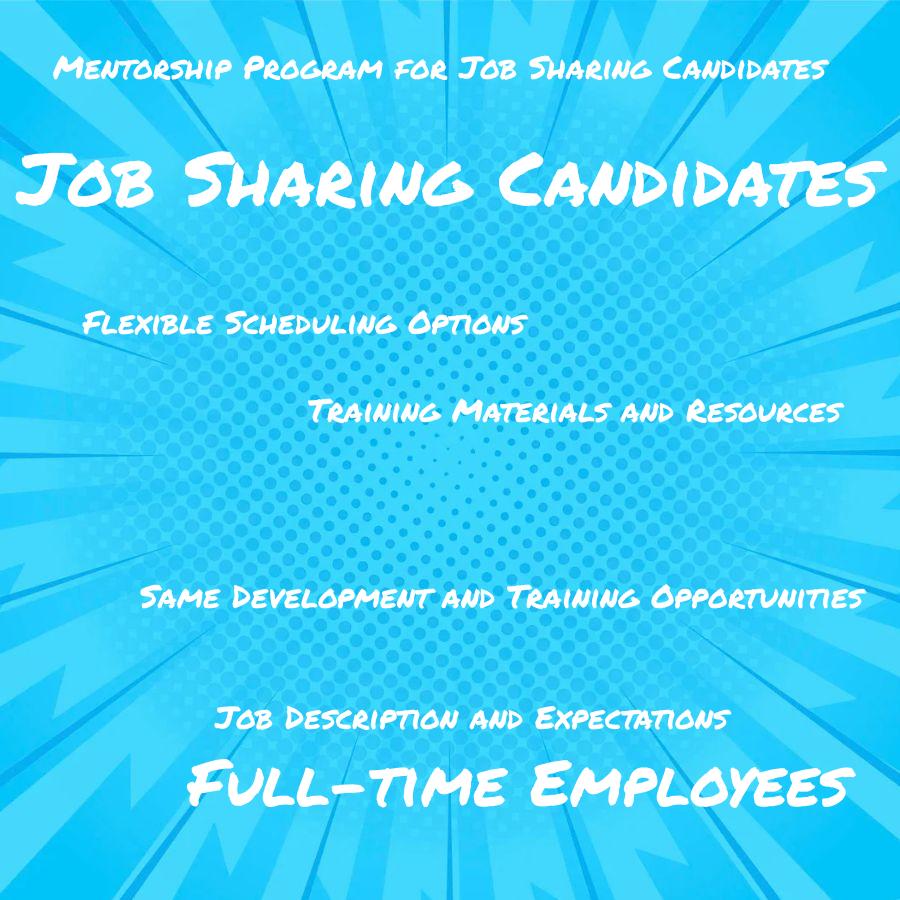We ensure job sharing candidates have access to the same development and training opportunities as full-time employees by providing them with equal access to the same resources, such as online learning platforms, mentorship programs, and other professional development activities.
Job sharing is an increasingly popular trend in the workplace, allowing two or more people to share the duties of a single job. While this arrangement can provide greater flexibility and work-life balance for employees, it also poses unique challenges when it comes to providing development and training opportunities.
In order to ensure that job sharing candidates have access to the same development and training opportunities as full-time employees, employers must take proactive steps. This blog will explore some strategies for making sure that job sharing candidates receive equitable access to development and training opportunities.
Provide Job Sharing Candidates With the Same Job Description and Expectations As Full-time Employees

This means that employers should provide job sharing candidates with a detailed description of their role, outlining what tasks they are expected to complete, how many hours per week they will be working, and any other relevant information. Employers should make sure that job sharing candidates understand the expectations for their performance in terms of quality and quantity of work.
By providing clear expectations from the start, employers can ensure that job sharing candidates have access to the same development and training opportunities as full-time employees.
Offer Flexible Scheduling Options to Accommodate Both Parties
Flexible scheduling allows both parties in a job share arrangement to work around their individual schedules, while still having access to the same resources and opportunities. This could include allowing one party to attend a training session or workshop during their partner’s shift, or providing additional time off for one party so they can attend a professional development event.
By offering flexible scheduling options, employers can ensure that both parties in a job share arrangement are able to take advantage of the same learning and growth opportunities available at the company.
Provide Access to the Same Training Materials and Resources
This can be done by making sure that all training materials, such as online courses, videos, or documents, are available to both job sharers and full-time employees. It is important to provide job sharers with access to the same resources as their full-time counterparts.
This includes providing them with access to any internal databases or systems used by the company for learning purposes. It is essential that job sharers receive invitations to attend any relevant workshops or seminars offered by the company so they can stay up-to-date on industry trends and best practices.
By taking these steps, employers can ensure that job sharing candidates have equal access to development and training opportunities as their full-time colleagues.
Create a Mentorship Program for Job Sharing Candidates
This program would involve pairing job sharing candidates with experienced professionals in their field, who can provide guidance and advice on how to navigate their career paths. The mentor could also help the job sharers identify relevant training courses or seminars that may be beneficial for them, as well as providing support and encouragement throughout their journey.
Mentors can offer insight into potential career paths and provide feedback on resumes or other professional documents. By creating this type of mentorship program, job sharers will have access to the same resources available to full-time employees, allowing them to develop professionally at the same rate.
Ensure That Job Sharing Candidates Are Included in Team Meetings and Events
One way to do this is by including job sharing candidates in team meetings and events. This means making sure that they are invited to any meetings or events related to their role, such as team building activities, brainstorming sessions, or professional development seminars.
It also means providing them with the same resources and materials that other employees receive so they can stay up-to-date on company policies and procedures. It’s important to ensure that job sharing candidates are given equal consideration for promotions or other career advancement opportunities within the organization.
By taking these steps, employers can create an inclusive environment where all employees feel valued and supported in their roles.
Provide Equal Opportunities for Career Advancement and Promotions
This means that job sharing candidates should be given the same consideration for promotions, raises, and other forms of recognition as their full-time counterparts. It also means that employers should provide job sharing candidates with access to the same professional development resources, such as mentorship programs, workshops, seminars, or online courses.
Employers should ensure that job sharing candidates are included in any team building activities or networking events so they can build relationships with colleagues and gain valuable insights into their industry. Employers should make sure that job sharing candidates are aware of any internal openings or external positions available within their organization so they can apply if desired.
By taking these steps to provide equal opportunities for career advancement and promotion to job sharing candidates, employers can ensure they have access to the same development and training opportunities as full-time employees.
Encourage Collaboration Between Full-time Employees and Job Sharers
This can be done by creating a culture of open communication, where both parties are encouraged to ask questions, provide feedback, and offer support. It is important to ensure that job sharers are included in team meetings and other professional development activities.
This will help them stay up-to-date on company policies and procedures as well as any changes or updates that may affect their role. Providing resources such as online courses or webinars can help bridge the gap between full-time employees and job sharers by giving them access to the same learning materials.
By taking these steps, employers can create an environment where all employees feel valued regardless of their employment status.